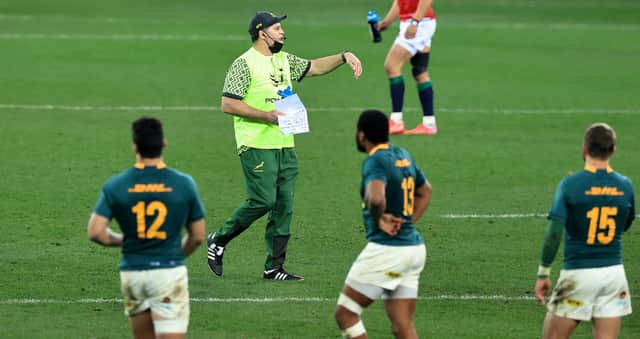Rassie Erasmus is using tiresome mind-games to try to influence the referee and assistants


Quite so. South Africa lost the first Test and Rassie Erasmus has been giving tongue ever since. I’ve no idea why. Has he a genuine grievance or is he just engaging in what we now call “mind games”? One of his complaints is that the Australian referee, Nic Berry, didn’t treat the Springbok captain Siya Kolisi with the same respect as he accorded to Alun Wyn Jones. Really?
There were a lot of penalties – too many, sadly – in what was a rather sub-standard Test, even if a very gripping one. The penalty count went against the Lions in the first half, against the Springboks in the second. This doesn’t suggest any bias to either, it suggests simply that the Lions played better in the second half. Not under pressure, they conceded fewer penalties. So, just as it’s the losing side that complains about the refereeing, it is also the case that team that is under pressure that starts to give away penalties. Simple as that: no need to presume refereeing bias.
Advertisement
Hide AdAdvertisement
Hide AdStill this mini-storm has elicited a splendidly pompous response from Rugby Australia: “there is no place for abuse of officials in Australian rugby.” Pull the other one.
There’s a distinction to be made between what happens on the field during a match, and what happens afterwards. The referee’s decision is final. Quite. It shouldn’t be questioned on the field. Nevertheless, it has now become quite usual for a captain and sometimes other players to seek to draw the referee’s attention to something he may not have spotted and so to suggest that he consults his off-field colleague, the TMO, and then have another look at the replay on the big screen. It’s not that long since this sort of things would have been frowned on, and indeed more than somewhat. But given that everybody is now familiar with replays in which, especially when in slow-motion, you see what you never spotted, it’s not unreasonable that captains should sometimes ask for a second opinion. I doubt if anyone could call a polite suggestion that the ref might check if a pass was forward or a player onside “abuse of the referee”.
Still it’s Mr Erasmus’s post-match criticism of the refereeing and his decision to express this in a video posted on his website that have really stirred things up. Again, it defies the convention that public criticism of the officials is bad form. No doubt it is. No doubt we might all seek to accept what seem to us poor decisions and just give a shrug of the shoulder, meanwhile muttering, ‘that’s life’. One can however make a distinction between players questioning the referee during the match and officials and others criticising decisions subsequently. Then one may judge than there is no more reason for the referee to be exempt from criticism after a match than is the player who misses a vital tackle or the coach who has picked the wrong team.
Of course while Mr Erasmus may indeed be nursing what seem to him legitimate grievances, he’s not really looking back at last Saturday’s Test. He is trying to influence this week’s referee and assistants. He is engaged in one of these rather tiresome mind-games, just as Warren Gatland was when he wondered very publicly if it was right that the TMO should be South African.
It’s rather sad that in rugby we are now following hard on football’s heels and giving at least as much attention to the words of coaches and managers as to the performance of the players. Perhaps this is inevitable in the digital world.
Last week was close. The best feature of the Lions performance was their ability to keep their nerve after a truly appalling first quarter in which they gave away a succession of penalties, so many that they seemed to have laid down a welcome mat for the Springboks.
I would be surprised if this afternoon’s match isn’t just as hard, even brutal, and tense. It would be a surprise, but a very pleasing one, if it is a more expansive game. And I trust that someone has pointed out to Robbie Henshaw that holding the ball in one hand, away from your body and pointing downwards, when you have made a dent in the opposing defence, is not very bright. It cost the Lions five points, possibly seven, on Saturday.
Finally, how many minutes were eaten up last week as we waited for goal-kickers to kick. Ten? A dozen? More? Outlaw the place kick. Replace it by the drop.
A message from the Editor:
Advertisement
Hide AdAdvertisement
Hide AdThank you for reading this article. We're more reliant on your support than ever as the shift in consumer habits brought about by Coronavirus impacts our advertisers. If you haven't already, please consider supporting our trusted, fact-checked journalism by taking out a digital subscription
Comments
Want to join the conversation? Please or to comment on this article.
